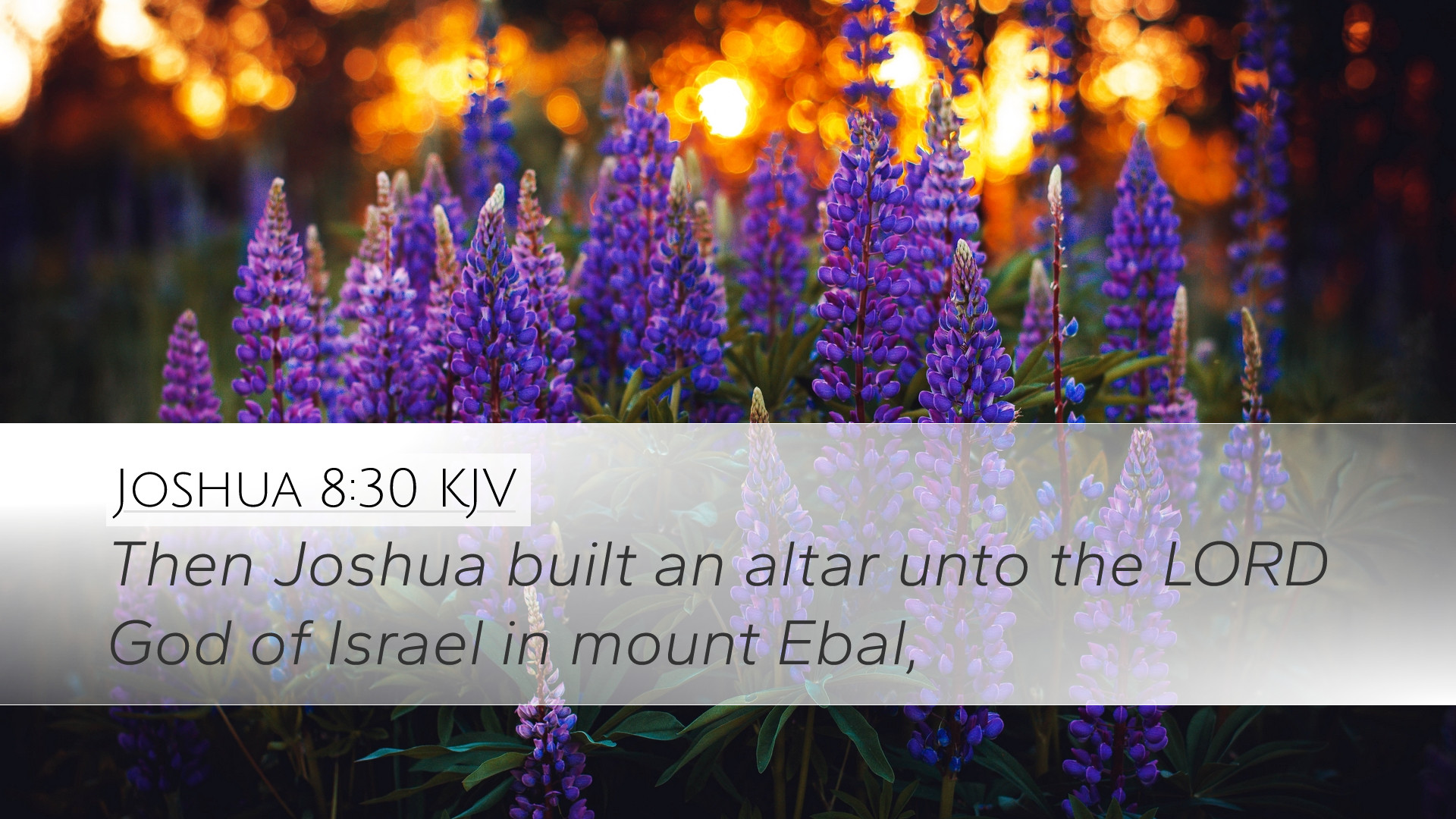Commentary on Joshua 8:30
Joshua 8:30 states:
"Then Joshua built an altar to the Lord God of Israel in Mount Ebal."
Introduction
This passage holds significant theological and historical importance in the narrative of Israel’s possession of the Promised Land. The act of building an altar on Mount Ebal serves as a key moment in the journey of the Israelites under Joshua's leadership. This commentary synthesizes insights from renowned public domain scholars to explore the implications of this sacred act.
Historical Context
Understanding the context in which this event took place is crucial. Following the fall of Jericho and the subsequent defeat at Ai, the Israelites are reaffirmed in their covenantal relationship with God. The command to build an altar is rooted in Mosaic law, specified in Deuteronomy 27:4-8, which directs the Israelites to erect an altar on Mount Ebal, emphasizing the importance of obedience and remembrance.
The Significance of Mount Ebal
Mount Ebal, known as the mountain of cursing, contrasts with Mount Gerizim, the mountain of blessing. Albert Barnes highlights that the location was strategically chosen to symbolize the dual aspect of God’s covenant—blessing for obedience and curses for disobedience. The altar on Ebal thus embodies the gravity of their commitment to adhere to God's commands.
The Purpose of Building the Altar
The altar served several purposes:
- Worship and Sacrifice: It was a place for offerings and sacrifices, reinforcing the people's need for atonement and communion with God.
- Covenantal Recall: Matthew Henry notes that it was intended as a memorial, reinforcing the covenant made at Sinai and their commitment to God through faith and obedience.
- Instruction to Future Generations: This act was meant to teach future generations about God’s requirements, ensuring that the lessons of faithfulness were passed on.
Theological Implications
This act of worship encapsulates the essence of Israel’s relationship with God. Adam Clarke emphasizes the theological ramifications that lie within the act:
- Covenant Faithfulness: The altar was a proclamation of Israel’s fidelity to God's covenant. It serves to remind us that acknowledging and remembering God’s promises is vital to maintaining covenant faithfulness.
- God's Sovereignty: Building the altar signifies dependence on God's sovereign guidance. They recognized that their fortunes depended not on their military prowess, but on divine favor.
- Reconciliation and Worship: It illustrates the importance of worship as a means of reconciliation. The altar represents a space for the Israelites to return to God after failure and sin, emphasizing the importance of maintaining a relationship with Him.
The Role of Leadership
Joshua’s initiative reflects his commitment to God and his leadership role. Henry asserts that Joshua was not merely a military leader but an exemplar of godly leadership in worship. By prioritizing this act, Joshua acknowledges his dependence on God and leads the people to do the same, thereby solidifying his role as a spiritual guide.
Lessons for Today
This verse and the surrounding context provide a wealth of lessons for contemporary believers:
- The Importance of Worship: Building an altar signifies the centrality of worship in the life of faith. Today, believers are reminded to prioritize communion with God through regular worship, prayer, and sacrifice.
- Remembrance of God's Faithfulness: Just as the altar served as a memorial, Christians today are called to remember God's faithfulness in their lives and to commemorate His works in their communities.
- Obedience to God’s Command: The context teaches the necessity of adhering to God's commands as essential to experiencing His blessings.
- Spiritual Leadership: Leaders must serve as examples of faithfulness and encourage those they lead to return to God, reinforcing the community's spiritual commitment.
Conclusion
In conclusion, Joshua 8:30 effectively illustrates the profound spiritual and communal significance of covenant renewal through the construction of an altar. Scholars, pastors, and laypeople alike can glean insights into the essence of worship, the importance of remembering God's promises, and the need for obedience. As the church reflects on this passage, may it inspire a deeper commitment to God and His ways.


